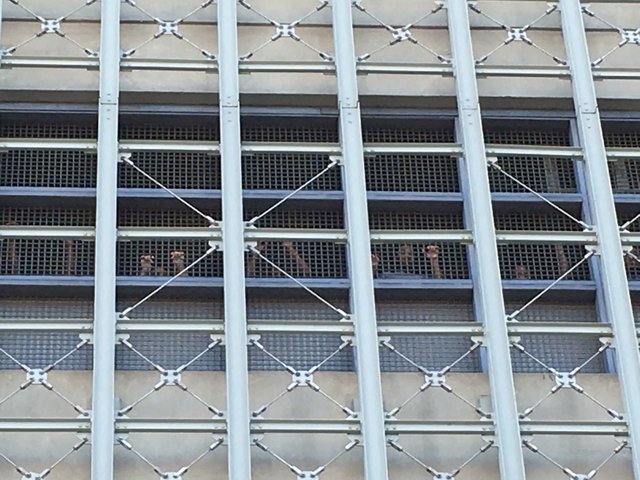Fire At Notorious Brooklyn Federal Jail As NYC Enters Heat Wave
July 19, 2019, 6:21 p.m.
Lawyers visiting clients when the fire broke out said the facility went into lockdown, and reported acrid chemical smoke coming from vents as they were escorted out of the building through a smoke-filled lobby.

People incarcerated inside MDC banged on the gates during protests in February
Five months after electrical fire at the federal jail in Brooklyn plunged the cells into darkness, leaving the people awaiting trial there locked down in freezing temperatures with inadequate medical care for a week, the Metropolitan Detention Center was on fire again Friday afternoon.
At 3:24 p.m. the New York Fire Department was notified of a fire in a second-floor laundry room at the jail. Twelve units with 65 firefighters responded to the blaze, and it was reported to be under control by 3:58 pm. Six people suffered minor injuries and were taken to local hospitals for treatment, according to the FDNY.
Lawyers visiting clients at the jail when the fire broke out said the facility went into lockdown, and reported acrid chemical smoke coming from vents as they were escorted out of the building through a smoke-filled lobby.
MDC Brooklyn did not respond to requests for comment.
Lawyers who represent clients at MDC Brooklyn report that just as cells often become uncomfortably cold in winter, they can become uncomfortably hot in summertime. With temperatures as high as the 100s projected for New York City this weekend, and city officials warning New Yorkers of the dangers posed by the heat wave, incarcerated people and their advocates are concerned.
Brooklyn Defender Services, which represents poor defendants in Brooklyn, issued a warning today about conditions on Rikers Island and other City Jails: “Most incarcerated people are without air conditioning and the limited number of fans are only in the day rooms, leaving people to swelter, particularly while in their cells. DOC is not providing appropriate summer clothes to many of our clients. People with medical needs have reported feeling nauseous and dizzy.”
The humanitarian crisis at MDC last winter arose after heating units ruptured and an electrical fire knocked out power to much of the facility.
Herman Quay, the warden at the time, misled public officials and the press about the scope, severity, and nature of the problems at the jail, insisting throughout that incarcerated people were free to move around their units (they were locked down in unlit cells for most of the week), that hot water was available in cells an showers (it was not) and that they had adequate medical care (a visiting federal judge spoke to people with conditions ranging from sleep apnea to suicidal mental illness to suppurating gunshot wounds who had gone days without medical attention).
Public outcry and the dismay of elected officials like Rep. Nydia Velazquez (D-Brooklyn) and Rep. Jerry Nadler (D-Manhattan) led the Bureau of Prisons and the Office of the Inspector General to promise to conduct thorough investigations into what went wrong at the jail. Those reports have not yet been released, but last month, Quay was nonetheless promoted to oversee three federal facilities in Pennsylvania, where he is responsible for twice as many incarcerated people as he was at MDC Brooklyn.